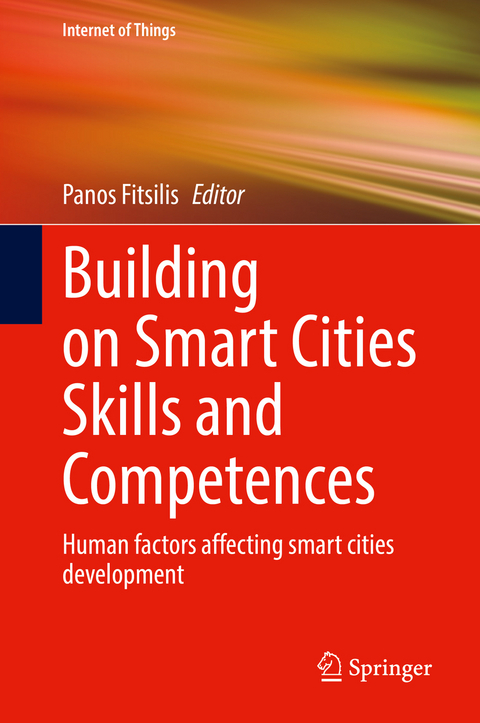
Building on Smart Cities Skills and Competences
Springer International Publishing (Verlag)
978-3-030-97817-4 (ISBN)
This book provides insights on skills required to achieve success in smart cities from a variety of industry and human factors perspectives. It emphasizes the balance between learning skills, technical skills, and domain-specific skills in these industries, with special emphasis given to innovative software development models. The authors note that digital transformation requires complementary measures that are not overtly aimed to support infrastructure investment but are instead directed at promoting entrepreneurship, improving digital skills, engaging citizens, applying new transformation strategies, and developing innovative software. All of the above are considered strategically important, especially for medium-sized cities since that enable them to be more competitive in the global economy.
lt;p>Professor Dr. Panos Fitsilis is a Full Professor at the Business Administration Department of the University of Thessaly, Greece. He has extensive project management experience with the development and deployment of large IT systems and extensive management experience in various senior management positions.
During his career, he has been responsible for the development, deployment, and operation of a number of prestigious IT systems for the European Commission, the European Parliament, multinational companies, etc. He has worked in more than 60 research or commercial IT projects, in various roles (programmer, project manager, quality engineer, business unit manager, consultant, reviewer).
He is the author of four books: "Contemporary Business Information Systems, 2nd edition", "A practical guide to entrepreneurship - case studies", "Software Project Management", "Object-Oriented Development using UML" and the author of more than 100 papers published at scientific journals and international conferences. Recently, he coordinated the development effort, and he is one of the authors of the first internationally available book on "Smart Cities Body of Knowledge".
Currently, he is a member of the working group for "Smart and Viable Cities" at Hellenic Standardization Organization, member of ITU initiative "United for Smart Sustainable Cities" (U4SSC), Greek National Representative in CEN/TC 428/WG 2 for "Competence, skills, knowledge, and roles".
His research interests include smart cities, smart factories, business information systems, educational technology, software project management and agile methods, skills development, etc.
Part I. Skills and competences for smart cities' development .- Chapter 1. Identifying emerging smart city job roles and skills to build a smart city workforce.- Chapter 2. The co-evolution of the digital transition and appropriate skills at city level.- Chapter 3. Preparing for Future Competences: trends arising through keyword and review analysis.- Chapter 4. Building Smart City Knowledge and Competences Using Problem-Based Learning in a Blended Learning Environment.- Part II. Strategy and Projects.- Chapter 5. The dynamic formation of a successful smart city roadmap.- Chapter 6. Sustainable Digital Transformation of Urban Landscape through Disruptive Technologies and Standards.- Chapter 7. Smart cities: Emerging risks and mitigation strategies.- Chapter 8. City Resilience and Intelligence - Interrelation and Reciprocity.- Chapter 9. Smart city projects evaluation: a bibliometric approach .- Chapter 10. Modelling Project Management Complexity in Smart Cities Projects.- Part III. Citizen engagement .- Chapter 11. Learning to engage citizens to make smarter cities. .- Chapter 12. Smart City Ambassadors develop skills and raise awareness in Oman.- Chapter 13. At the Root of the Smart Cities: Smart Learning Ecosystems to train Smart Citizens.- Chapter 14. Towards e-deliberation 2.0.- Chapter 15. No-Code for Smart Cities.- Part IV. Smart cities innovative technologies.- Chapter 16. A Big Data Analytics Framework for A Smart City: A Case Study.- Chapter 17. RES-Q: Towards semantic interoperability for risk and disaster management in smart cities.- Chapter 18. Blockchain for Smart Cities: Findings from a Systematic Literature Review.- Chapter 19. Artificial Intelligence, Big Data Analytics and Smart Cities.
| Erscheinungsdatum | 08.07.2022 |
|---|---|
| Reihe/Serie | Internet of Things |
| Zusatzinfo | XVI, 334 p. 50 illus. in color. |
| Verlagsort | Cham |
| Sprache | englisch |
| Maße | 155 x 235 mm |
| Gewicht | 685 g |
| Themenwelt | Technik ► Elektrotechnik / Energietechnik |
| Schlagworte | Agile software development • kanban software development • Lean Software Development • smart cities • smart cities models • smart city privacy and security • smart city resilience |
| ISBN-10 | 3-030-97817-6 / 3030978176 |
| ISBN-13 | 978-3-030-97817-4 / 9783030978174 |
| Zustand | Neuware |
| Haben Sie eine Frage zum Produkt? |
aus dem Bereich


